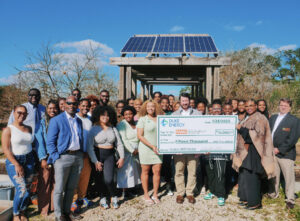
Duke Energy provided FAMU with a generous donation of $15,000 this past week. Planning to use the donations for their SEED Garden, faculty and students gathered to acknowledge this celebratory moment.
Being a student-run initiative, FAMU students have worked hard to get to the position that they’re in now. With the purpose of raising awareness of environmental issues that can benefit that campus, this initiative can also educate the Black community about the importance of having a clean campus and environment.
SEED, also known as sustainability, education, and engagement destination, is the abbreviation of this movement. Vice President of the FAMU Sustainability club, Khalil Valcin, has high hopes for the future of the SEED Garden. Planting one goal at a time, Valcin wants his FAMU community to become a safe space for volunteers.
“We hope to expand and organize the club in such a manner that we reach the minds of all the students and staff on campus most efficiently and effectively,” said Valcin. “More students will share more accomplishments of creating food that can be used by others.”
Reflecting on this remarkable day, FAMU student Lailah Hall describes it as a “surreal” moment. Hall says that it was one of the most beautiful days for FAMU.
“We introduced ourselves to the Duke Energy representatives… I remember the excitement they had for us in restoring the garden as well as the passion.”
Having a track record of donating to HBCUs, Duke Energy News stated the beginning of a partnership challenge in 2018 with the plan to work with companies and develop connections through the school. Duke Energy has donated more than one million dollars to support students in pushing the lifestyle of living green.
Kole Fortson is one of the members of the Sustainability at FAMU Initiative. Fortson is already in the FAMU College of the Environment and highlights the objective of continuing to expand the garden. Searching for volunteers and disregarding what their majors are, Fortson is striving for an understanding of agriculture.
“We can all contribute our expertise to an initiative that promotes a healthy and sustainable way of living, not just on our campus but for the community as well.”
When asking the students about a personal initiative they would like to see for the garden, all agreed with their gratitude for the money Duke Energy donated and would like to see it working towards the demonstration of food. Educating the campus and community about healthier alternatives to survive continues the initiative of growing green in our garden.